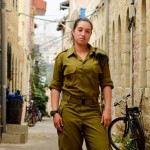Interview with Asher Lovesky October 14 2013
"Find something worth dying for, and live for it."
Since immigrating to Israel 3 years ago from Massachusetts, this motto has inspired courageous decisions that have become a matter of routine for Asher Lovesky, 21, a lone soldier nearing the end of his combat service in the 890 Paratroops corp.
Born into an impartial, middle class Reform family ("High Holiday Jews" as he describes them), Asher was brought up with only a vague sense of his Jewish identity, and a distant affinity for Israel.
"I could always say I was pro-Israel" he says, "but I don't think I would have known what that meant. I was pretty uneducated about Israeli affairs; growing up I wouldn't even know what the debate was about".
At the age of 3 years old Asher’s parents separated, and he split his time living with each of them until his graduation. He was raised in the public school system in Wayland, a town just outside Boston, and felt strongly that being accepted to anything other than an Ivy League College would be inadequate. At the same time, his grades suffered somewhat due to his being “quite the party animal”.
"I was a huge partier" Asher reminisces, "I was the center of every party. I had a very active social life, and I got into mischief. The turning point for me was when I received mediocre grades upon graduation, and I figured I needed to take some time to mature, get disciplined, and work on the things I was lacking. I considered the US army, and made it to the recruiter's office for the Marines, but they wouldn't accept me because of their regulations on tattoos."
Peeking out underneath the sleeve of his khaki uniform, Asher's left arm is adorned with an intricate portrayal of a geisha, a display of his fascination with Asian culture. His first tattoo dates back to the age of 16; a Thai banner on his upper chest that reads: “Yesterday's regrets, tomorrow’s worries; these are the twin thieves that rob you of the moment". Or in plain Latin, Carpe diem. It would seem that spontaneity and intuition have paved the way for many of his life decisions, not excluding his decision to move to Israel, which only became a possibility when a friend of his began inquiring into the move for himself.
"We were kind of in the same boat, he wasn't sure what to do, so he threw the option of the IDF on the table. He was mentioning it for himself but I decided to look into it. I had never been to Israel, so my decision started with me searching the IDF on google images and youtube and I was like ‘Yeah I like this!’”, Asher recalls, half-jokingly. " My parents were shocked, but once they looked into it and heard that there is a supportive community of lone soldiers they felt more comfortable about it. But when my friends found out I had decided to stop bumming around and join the IDF they couldn't believe me, they thought I was joking! "
Asher put his money where his mouth was. He contacted Sar-El, a short IDF-run volunteer program for tourists, and bought a one-way ticket to Israel. He spent the first 6 weeks living at Beit Hachayal in Jaffa and working on an army base. Afterwards he figured he'd had enough and wanted to get the ball rolling towards a more meaningful occupation. While waiting for his enlistment date, he decided to discover Israel off the beaten track together with Tim, a friend he met in Sar-El from Zimbabwe (henceforth known as Timbabwe).
"We hitch-hiked up to the coast to the Golan, we hiked around without a map and took directions from passer-bys, we camped in parks. Timbabwe was a great guy, we got along, we both wanted to get to know Israel."
After exhausting his travel funds, Asher found himself back in Jerusalem, where he stayed in Heritage House, a hostel that provides free lodgings to Jewish travelers as part of Aish HaTorahs' outreach program. Up until then, Asher had little knowledge of religious Judaism, and so it came about that the tattoo-sporting traveler found himself learning Torah alongside Ultra-Orthodox Jews, and even decided to observe Jewish rituals at that time. In the midst of his studies, that he met Tzippy, his current girlfriend of 2 years – an Orthodox girl from Teaneck NJ who was learning in a Jerusalem Seminary.
"Boy did I fool her with tzitzit and a kippah… she was all for it like "He has tattoos and he's dangerous… but he's a nice Jewish boy". Now her joke is "You tricked me".
Although no longer observant, when speaking to Asher it is clear that his brush with religion has transformed much of his perspective on the significance of Judaism and Israel. "There's another spiritual battle field out there – a lot of Jews are being lost to gollus (exile), but ideologically I believe that this is a country for Jews. Israel is our home".
And so when the enlistment date arrived, Asher had high expectations from himself.
"It was nail-biting. I had every intent to be special forces, I had come all this way to enlist so I didn't want to do anything half-assed, I had been working out and I wanted to be the best soldier I could be. Like many immigrants, when I first arrived I asked people what was the best unit, everyone said Sayeret Matkal, and so that was what I wanted. But I didn't know any Hebrew, I could say "Shalawm" and that was about it".
Asher ended up being accepted to Tzanhanim (paratroopers), and following his training was stationed on the border with Gaza after Operation Pillar of Cloud.
"I'm so glad to be in Tzanhanim, I 100% believe they work us harder than other units, and it pays off – I mean, when you're looking for a front line unit, Tzanhanim would be some of the first forces in any upcoming operation.
"On the other hand, I was disappointed with the army diet, with the lack of physical strength maintenance. I was also disillusioned by the lack of operational activity once Id finished training; I prefer to be doing something than doing nothing. I came with an American conception of what it means to serve – guns blazing, taking names down, justice, democracy, I dunno… it's been much more trivial than I expected… I figure it's just the period that we're at right now. Either way, I've become a lot more patient – "hurry up and wait" seems to be the army policy – they'll get you ready and moving and then realize they have nothing to do with you."
Despite longing for more action, Asher feels he has developed as a person and has formed deep friendships with the native Israeli soldiers in his unit. Other lone soldiers have a harder time.
"Personally I get along very well with the native Israeli soldiers, I love them. Some lone soldiers clash with them. We have very different cultures, we're very different people with different etiquettes that sometimes clash."
Although Asher got along well with comrades, he definitely had his fair share of problems dealing with the army.
"Not only money problems, but getting time to take care of my personal life. As a lone soldier, you need to take care of your finances but the army does not always care enough to provide you with time off to sort stuff out. It's difficult to understand a lone soldier’s needs if you're not a lone soldier and the army is not run by lone soldiers".
It is precisely this unique understanding of the lone soldier army experience that guides the Lone Soldier Center in Memory of Michael Levin in providing assistance to lone soldiers. The Center is primarily run by former lone soldier volunteers who are familiar with the challenges of serving in the IDF without family support.
"I wish I had been more involved with the Lone Soldier Center from the beginning of my service because they are truly amazing; they are a network of people who really care. Initially, it was more important to me to be independent and to manage my problems alone. I decided to seek out their assistance when shortly after enlisting I still hadn't been recognized by the army as a lone soldier due to some technical glitch and I wasn't going to get my living stipend. I came to the Center, and they made the necessary phone calls on the spot, within 5 minutes they had the problem taken care of. "
“The Lone Soldier Center is like a family, they hooked me up with furniture when I moved into my apartment, they jumped on my medical problems and called the hospital to get test results for me. Whenever I have a problem, I can rely on them to put pressure on the relevant places to get things sorted out."
When asked what tips he has for immigrants considering service as a lone soldier, Asher recommends Garin Tzabar as the best support system to get through military service. Other than that, he emphasizes the importance of Hebrew in being accepted to elite units, and advises not to rely solely on the army Ulpan course to get language skills up to scratch. On a humorous note, a simple commodity that is worth the monetary investment in the field? Baby wipes. ("one baby wipe does the job, whereas the toilet paper you can afford will take its' toll on your rear end")
Asher laments a trend he has become familiar with, where immigrants start off with sky-high motivation to be accepted to the best units, which is lost when they are put in different units. Asher now believes that the service itself is what counts, not the unit you’re serving in.
"There is actual meaning to what the IDF does – its' the Israeli Defence Force – you are defending this nation that needs defense ".
With 8 months of service left to his release, Asher knows that Israel is the place he wants to live.
"I need to end up here, I want to raise a family here.I consider myself fortunate that I found Israel or that Israel found me. " Asher aspires to study Counter-Terrorism Studies at IDC to build upon his security experience.




